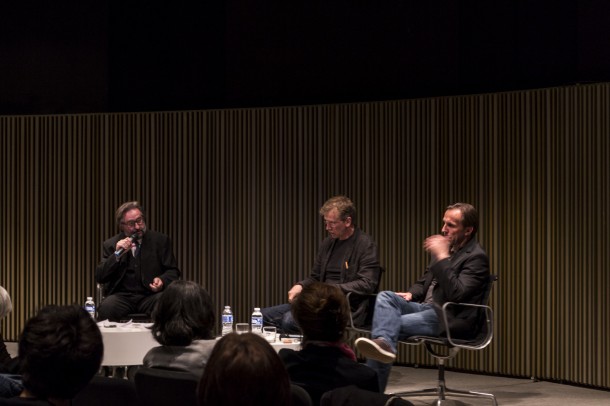 The Jackson Pollock Bar performance at MACBA, may 2013
The Jackson Pollock Bar performance at MACBA, may 2013Radically inconclusive – Art & Language
Recently at MACBA the seminar Radically Uncompleted, Radically Inconclusive. On Art & Language’s legacy.. took place. Despite the fact that old school conceptualists often pass through the Raval, I was one of the few attending the event, so I think it’s worth mentioning. Above all because most of us are familiar with the Index, their representative exhibition of boxes full of indecipherable writing, however, the analysis of the dialogical practice of this collective was, and continues to be, extremely topical.
What were Art & Language actually talking about? The collective was created as a discursive project, as a social space in which to submit certain ideas to a form of interrogation. They fled from the modern tradition in which the artist had to remain in silence waiting for the works themselves to talk. They came together to have disorganized conversations about philosophy, psychoanalysis, political organisation, technology or cultural practices. Communication often failed, and improvisation as much as irrelevance was incorporated as part of the work.
Be it due to the lack of resources or, in the best of cases, the critique of institutions from within the institution itself, we are currently seeing a renewed interest not so much in the creation of objects per se, but in conversational and collaborative processes. In this way, a critical seminar about the pioneers of these practices counted on, for example the theorist Matthew Jesse Jackson, who had already realised–as part of Our Literal Speed– events in which the conference was imagined as a sort of “media pop opera” or “administrative gesamtkunstwerk”.
But the apogee of the seminar was doubtedly the “theoretical installations” by the German performance group The Jackson Pollock Bar. In the first, “Confession: Art & Language interviewed by Carles Guerra”, three people sat in the auditorium as if they were going to do an interview. They are neither Art & Language, nor Carles Guerra, and what is more they are doing it in playback, creating a strange reduplication of the original conversation. Suddenly, various members of the audience interrupt the dialogue with aggressive questions, also in playback. The intervention, with a high theoretical content, is sometimes left up in the air. But it doesn’t matter. In the second part, two of the members of Art & Language go up on the stage and become The Jackson Pollock Bar, who in turn replicated the musical element of Art & Language, The Red Krayola. We listen to what we can of an hour and a half long concert that digresses into the figure of the critic, the curator and the odd other indecipherable element. The interest lies in creating a mass of language and placing it in action, that sometimes connects and at other times enters into a short-circuit.
We’re used to the ritualistic context of an exhibition being altered, but in a conference or in a symposium experiments just aren’t possible, we have to behave in a certain manner, remain in silence and know how, and when, to talk. The spectator becomes an institution. Introducing something we don’t expect makes visible what wasn’t before, creating a new distribution of the material and symbolic space.
These practices made me think about the value of those discussions in loud, unorganised independent or alternative spaces, that don’t conclude with any definitive assertion. Maybe simply by being meeting places, places of conversation, of intellectual promiscuity and the production of knowledge, they are already a legitimate point of departure. As Art & Language draw the spectator out of the standardised practice of consensus, they re-politicize the art space and institution with a logic that, though it can be degenerative, always opens up a space of possibilities.